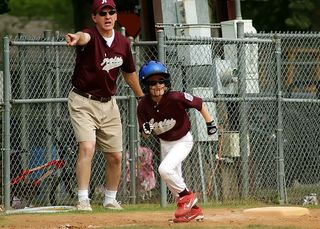Coaching
Nurturing the Coach-Athlete Relationship
Tips for nurturing connection
Posted August 26, 2019

A recent article of mine referred to the importance of investing in the coach-athlete relationship, suggesting that it is, ultimately, athletes’ perceptions of their coaches and their coach-athlete relationships that will determine the outcomes of coaching behaviors.
For instance, being provided with a degree of freedom and independent work can, depending on the aforementioned variables, suggest either that the coach respects them and is empowering or, alternatively, a lack of planning or indifference to the athlete’s goals and contributions.
Therefore, it would seem important to deliberately work on the coach-athlete relationship to cultivate mutual feelings of trust, clarity, and support. This article presents some strategies that may help coaches to nurture a strong sense of connection between them and their athletes.
Seek athlete preferences
I have often seen tension emerge between athletes and coaches, seemingly as a result of a lack of alignment. Co-orientation (shared values) and complementarity (behaving in complementary ways) are often referred to as important constructs within positive coach-athlete relationships.
It appears to be important that individuals within the relationship have shared views and ways of engaging that support each other. Therefore, pursue and, when possible, support your athletes’ preferences for various areas, including freedom, structure, degree of challenge, and decision-making.
Communication is important here. There will be instances when preferences align, and this makes things easier; however, it is inevitable that there will be a degree of misalignment from time to time. When this occurs, it is particularly important to discuss the plan going forward to ensure that clarity, respect, and trust are maintained. Once these are lost, it appears that it is difficult to get them back.
Disagreements are common between coaches and athletes; however, performance or satisfaction may not be undermined so long as effective communication is maintained. In reality, such disagreements navigated effectively may actually enhance performance in the long term, as each party becomes more willing to share ideas without fear of judgment or "rocking the boat."
Get to know your athletes
Athletes generally report preferences for coaches who care for them beyond the sporting environment. This does not necessarily need to (and perhaps shouldn’t) constitute a friendship; however, many athletes, even at the elite level, desire coaches that have a strong sense of regard for them as individuals and have an understanding of them and what is going on in their lives.
Showing an interest in your athletes’ lives, including areas such as family, work, and schooling is a great way to convey a sense of care and is likely to nurture stronger coach-athlete relationships. Furthermore, such knowledge can help you to engage with your athletes with a greater sense of empathy and, thus, enhance your athletes’ feelings of connection, which can contribute to improving both well-being and performance outcomes.
Check-in
It is helpful to check-in with your athletes from time to time to ensure that they feel a strong sense of support and are interpreting your coaching approach in ways that are consistent with the intent. A coach can be employing autonomy-supportive coaching behaviors, but if an athlete does not consider them as such, due to, say, a preference for more hands-on coaching, then the outcomes are likely to be very different from the underpinning rationale.
This can include lengthy discussions away from training settings that take place in a more relaxed setting. However, it can also just be brief chats during or following training sessions (e.g., “Hey, so what did you think of the new shooting drill?”, “Do you want me around more or less in those final few minutes before racing?”).
Such discussions encourage athletes to have a voice and to ensure that the enacted coaching behaviors are being perceived in the way that you intended. As a result, the connection between coach and athlete is likely to be enhanced.
Coaches play a key role in both athlete performance and well-being. The central role of the coach-athlete relationship should not be underestimated and, as such should be deliberately worked on. How are you working on yours?




